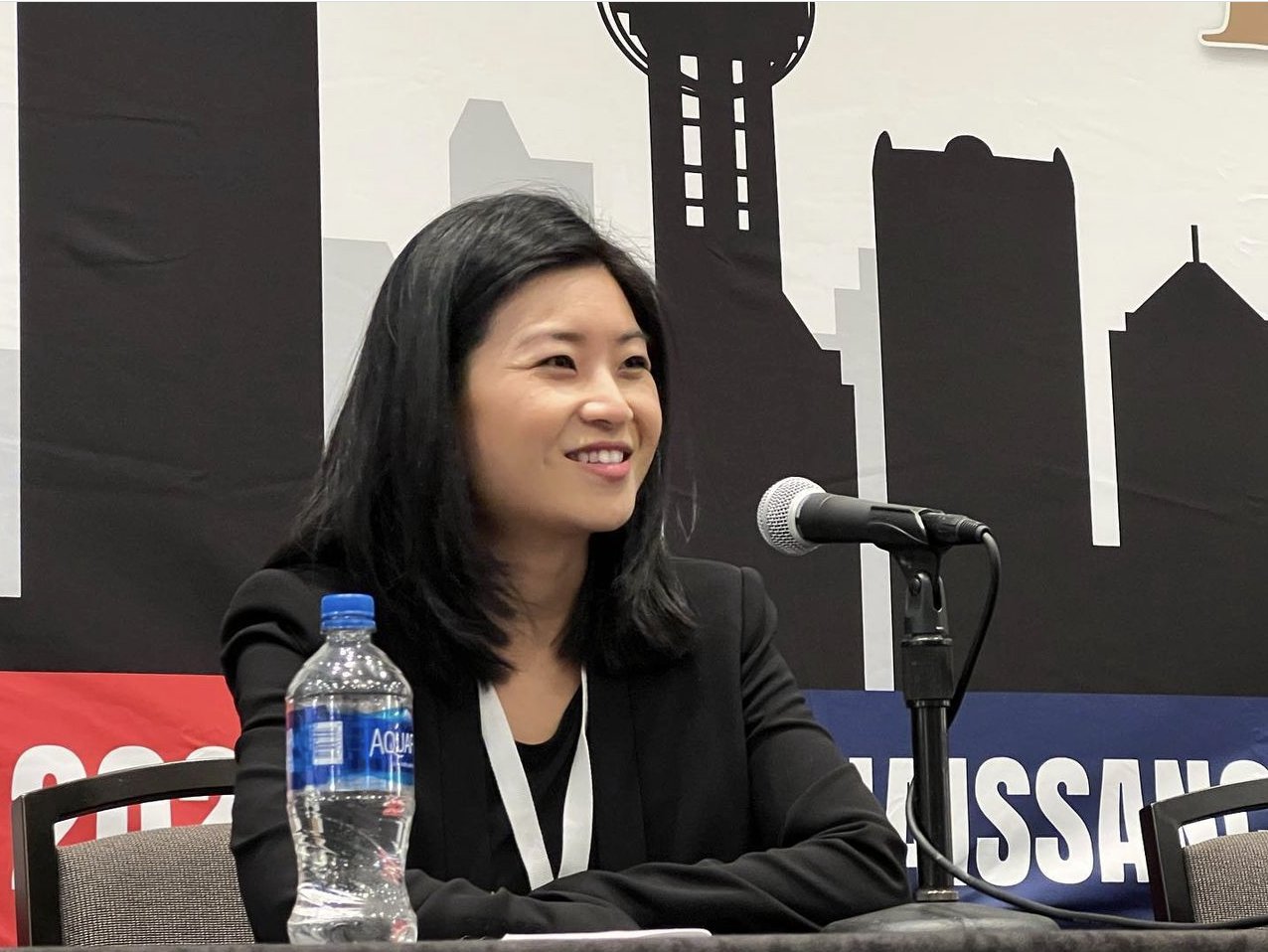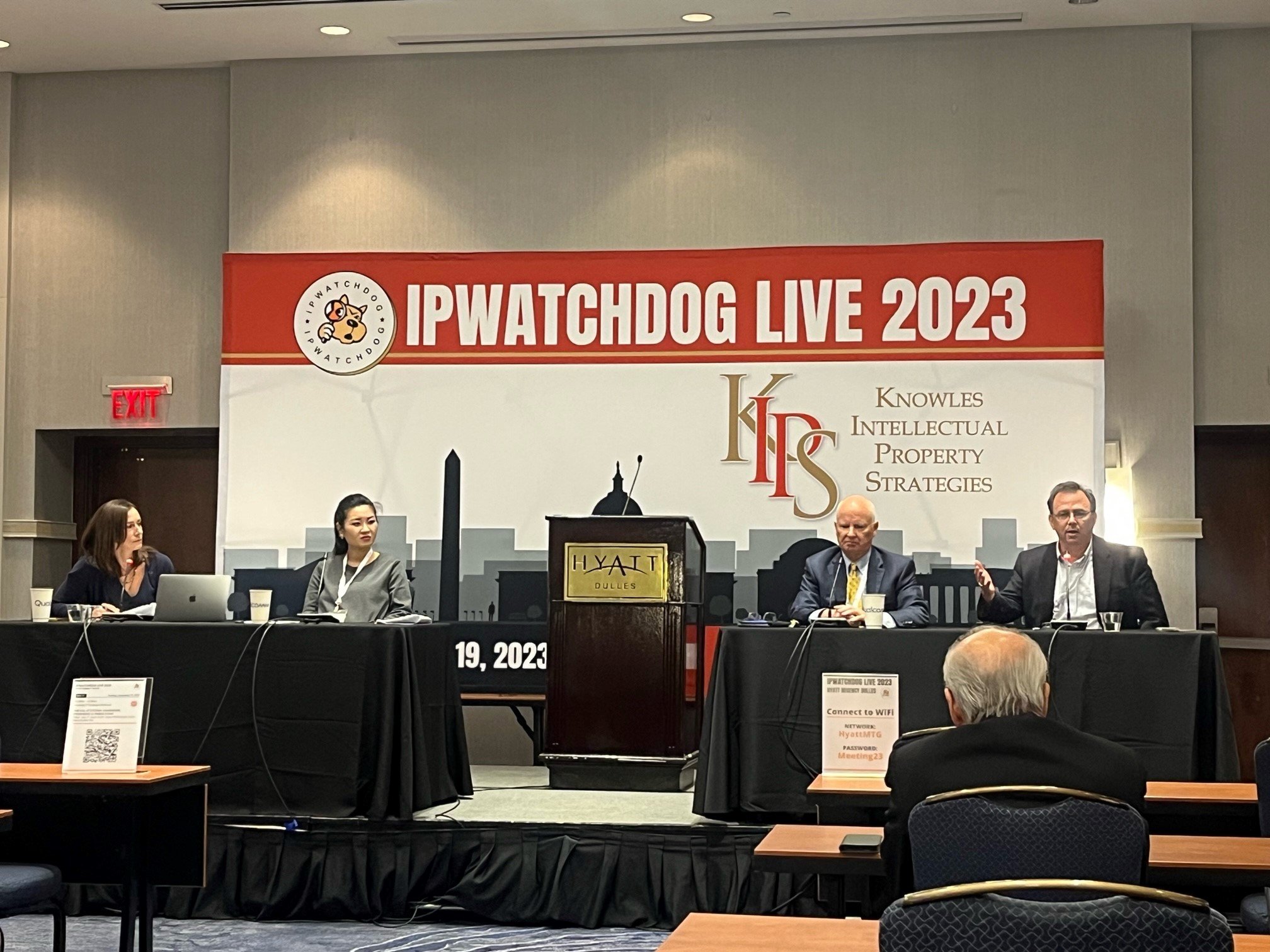Intellectual Property Attorney
Writer & Speaker
Vlogger & Creator
About me
I am a US patent attorney and founder of Lux Lumen Intellectual Property, PC. My practice focuses on global IP portfolio management and patent drafting. I am a frequent speaker and writer on US IP and innovation policy, particularly in regard to critical emerging technologies such as artificial intelligence, blockchain, computer-implemented innovations and electrical components. My writings have appeared in Forbes, National Law Review, IPWatchdog, Law360 and Buyers Meeting Point. I have been interviewed by various media sources with respect to protecting Covid-related inventions and artificial intelligence including Nature Biotechnology, Forbes and Supply Chain Now.
Introducing
Lux Lumen Intellectual Property, PC
Please note that I will no longer be updating this webpage but will be providing news and events on llpatent.com.
Check out the firm website for the latest news, vlogs and events.
Subscribe to IPWENSDAYS™
Watch the latest episode of IPWENSDAYs™ produced by Lux Lumen Intellectual Property, PC.
Patent Application Drafting
Writing AI and software patent applications is a large part of my practice. I write up to three applications per month, so I have written hundreds of applications in my ten plus years of practicing. Since 2021, AI and ML applications have comprised the majority of my applications.
Because my clients usually use my applications as the basis for foreign applications, I believe in writing simple and straightforward sentences so that the applications can be more easily translated.
Following AI policy and governance in the innovation sphere is an interest and passion of mine. Read my exclusive interview with Dr. Stephen Thaler on AI inventorship and AI’s role in conception in the innovation ecosystem here.
PUBLICATIONS
I am a featured contributor for IPWatchdog and a member of Forbes Business Council, therefore I mainly publish on these platforms. My articles for IPWatchdog are written for legal and IP policy specialists whereas my Forbes writings are directed to a business audience. I have also written for other publications on intellectual property and innovation policy. Feel free to check out my author pages.
Frequently Discussed
-
The Case for Patenting AI: U.S. Patent Laws Better Get Smart or Get Left Behind
How To Patent Artificial Intelligence And Machine Learning Models
AI Inventorship: Will Our Patent Laws Stand Up? My Conversation with Dr. Stephen Thaler
What is AI and How is it Treated by the USPTO, EPO and CNIPA? (Vlog)
Lessons For Startups And Small Businesses On Patenting AI
What the Patent Eligibility Restoration Act Means for Artificial Intelligence Inventions
-
Should Your Supplier Be On Your Patent Application?
When Commercial Success Can Prove Non-Obviousness
How To Build A Strong And Effective IP Strategy
Globalization Has Changed Intellectual Property—Here's What Companies Need To Know
How To Build A Patent Department As A New Or Expanding Company
Petitions Practice before the USPTO and Lessons from Stephen Thaler (Vlog)
How U.S. Attorneys Should Tackle Extended European Search Reports (Vlog)
Lessons in Calculating Patent Term (Vlog)
Understanding and Responding to Examiner Rationales for Prima Facie Obviousness (Vlog)
Practical Exercise – Let’s Design Patent the AirPods! (Vlog)
Critical Emerging Technology: Claiming and Disclosing Blockchain, Fintech and Cryptocurrency (Vlog)
Examining When Statements of Intended Use can Limit the Scope of a Patent Claim (Vlog)
Determining Obviousness in Design Patents (Vlog)
Software Claiming – A Look at Means-Plus-Function (Vlog)
Writing Strong Patents - Comparing the USPTO and Federal Circuit’s approach to 101 (Vlog)
The USPTO’s New Pilot Program – Deferred Subject Matter Eligibility Response (Vlog)
Should Your Supplier Be On Your Patent Application?
Design Practical Exercise – Protecting Variable Design Choices and Color
What the Patent Eligibility Restoration Act Means for Artificial Intelligence Inventions
-
-
Examining the Unforeseen Effects of the USPTO’s New Section 112 Guidelines
USPTO Guidance Not Helpful for Business Method Applications
What Unauthorized Manipulation of Starlink Signals Teaches Us About the Importance of IP
Responding to the USPTO’s Request for Public Comments (Vlog)
What the Patent Eligibility Restoration Act Means for Artificial Intelligence Inventions
-
-
The Diversity in Innovation Toolkit: A Living, Breathing Document Evolving with the Modern-Day Innovation Economy
Today’s Space Race
If you believe that Congress and US policymakers need to prioritize protecting American innovations, then we should definitely be friends. Everyday I speak to inventors and innovators about the challenges surrounding building and creating. It’s not an easy thing - coming up with a new idea, no less generating the monetary and capital investment towards transforming that idea into a commercial product.
Right now we are facing the gradual degradation of long-established legal and policy infrastructure that enabled some of the world’s greatest innovations to thrive, innovations that have enriched modern society. Whether we are talking about advances in cleantech, medicine, energy or telecommunications, our IP laws and policies are shifting away from fostering these innovations on US soil.
There are two main causes for this unwanted development: 1) the uncertainty surrounding patent subject matter eligibility with respect to software and medical advancement technologies due to recent Supreme Court decisions, and 2) the current Administration’s complicity in waiving intellectual property protections for Covid vaccines which may be expanded to include diagnostics and therapeutics.
I publish and speak frequently on this issue. Recently I testified before the US Chamber of Commerce’s AI Commission on the need for immediate Congressional intervention to protect innovations with respect to the development and deployment of artificial intelligence. You can watch my testimony here. I have also been interviewed on my views on US IP policy with respect to Covid vaccines, treatments and diagnostics by National Law Review and Supply Chain Now.
LATEST NEWS
-

Changes to AI Patent Practice in View of the USPTO’s Recent Actions
The United States Patent and Trademark Office (USPTO, the Office or the Agency) has recently issued multiple guidance and proposed rules that potentially change the landscape of patent practice. On top of that, the USPTO has also proposed substantial terminal disclaimer fee increases that can induce early filing of terminal disclaimers. The Agency’s actions will significantly impact patenting artificial intelligence and it is important to understand the USPTO’s position from a holistic perspective with respect to this critical emerging technology.
-

Forbes
Read the latest article:
What The EU AI Act Means For Your Patent Strategy
-

I'M SPEAKING
WOMEN IP FORUM
ASHBURN, VA
August 26-27 , 2024
-

Newest Interview
In the United States, patents are awarded for novel, non-obvious inventions that are disclosed for the benefit of all in exchange for 20 years of exclusivity… at least for now.
In this week’s episode of Art of Supply,
welcomes back patent attorney
to talk about pending rule changes at the
and the chilling effect they may have on disclosed innovation in the United States.

Recent Past Events
-
Interviewed and quoted in AI for drug discovery is booming, but who owns the patents?
-
This panel discussed practical tips and suggestions, and in particular discuss:
(1) What can practitioners do in terms of disclosure and claiming in order to survive 35 U.S.C. 101 and 35 U.S.C. 112?
(2) What does the Supreme Court’s decision in Amgen mean for AI patents and patent applications?
(3) What key points should AI practitioners take from the USPTO’s recent 112 Guidance?
(4) Is the USPTO’s 101 Guidance sill relevant, and if so which examples are still probative? Why? For what types of AI?
(5) How the landscape could change if PERA were to become the law.
-
Strategies for Using and Protecting Artificial Intelligence Related Innovations
https://ipwatchdog.com/sessions/patent-strategies-critical-emerging-technologies/
-
-
In the United States, patents are awarded for novel, non-obvious inventions that are disclosed for the benefit of all in exchange for 20 years of exclusivity… at least for now.
In this week’s episode of Art of Supply,
welcomes back patent attorney
to talk about pending rule changes at the
and the chilling effect they may have on disclosed innovation in the United States.
Mom Life
I’m a new mom. My daughter, Victoria, was born in October 2023. I think raising children can sometimes shake our confidence because such a large aspect of our lives is now out of our control. But I want to extend my support to all the working moms out there chasing dreams with their kiddies in tow - have confidence and believe in yourself.
You got this.
Express yourself
Express yourself
I was a very boring child. I had no hobbies and not very many artistic interests. I didn’t play any sports and I was a band geek in high school. On top of that, the band was not good and neither was I. Then Covid happened and I decided to try out a Bob Ross painting tutorial during quarantine. The rest is history. I call my painting style “trees-forward.” Comissions welcome.
In the community
I became interested in diversity in innovation while working on the Intellectual Property Owners Association’s Diversity in Innovation Toolkit. Today I am a member of the WingsWORLDQUEST Associate Board where I am on a team of visionary young women actively raising funds for supporting women in discovery, exploration and science. Support us here. Additionally, I serve on the English Pegasus Scholar Placement Committee at the American Inns of Court for the Pegasus Scholarship Trust, an exchange program for newly barred English barristers and US attorneys.







